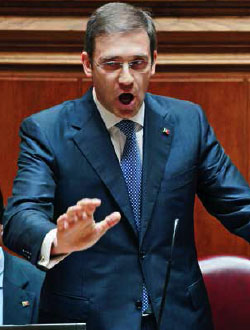Lisbon’s Diplomats and Global Bazaars

 Austerity has turned a once classical foreign service into travelling salesmen
Austerity has turned a once classical foreign service into travelling salesmen
Portugal’s centre-right coalition government, elected in 2011, in the context of a 78 billion euro IMF-EU bailout programme that expires in June 2014, has turned decisively – it would say ‘pragmatically’ – to so-called economic diplomacy in order to revive the country’s deeply injured national economy and pay down the national debt. All pretensions to grand strategy or fealty to Lisbon’s past imperial traditions have been cast aside.
Portuguese diplomats are now expected to become the finest salesmen of ‘made in Portugal’ products and services. Embassies are to become ‘business centres’ for Portuguese companies and ‘tour agencies’ advertising the joys and beauty and investment opportunities of the country. The Minister of Foreign Affairs, Paulo Portas – former director of O Independente, once one of Portugal’s leading papers – has enthusiastically transformed himself into the national champion of, and spokesman for, Portuguese exports, making it clear that it “is fundamental that Portuguese companies do not lose business opportunities abroad for lack of access to political decision-makers in [foreign] countries.”
Portugal has been long highly dependent on three export markets – all in the EU: Spain, Germany and France. The latest statistics suggest that these three countries account for half of Portugal’s exports. The EU as a whole accounts for nearly three-quarters of Portugal’s exports – down from approximately 80 percent in 2005. Non-EU markets, for their part, account for over a quarter of Portuguese exports – up from 20 percent six years ago. These numbers suggest that the significance of non-EU markets for Portuguese exports began to grow even during Portugal’s last Socialist government – that is, that the government of then-Prime Minister Jose Socrates was already pushing economic diplomacy as a means of diversifying the country’s export markets.
The current ruling coalition, under Social Democratic Prime Minister Pedro Passos Coelho, has pursued a major reorganization of the public service in general, and the foreign service in particular, in order to consolidate all of the national government’s foreign trade, foreign investment and tourism functions under the sole control of Portas. National representatives or emissaries abroad are now required to meet quantifiable targets in terms of trade promotion, sales and foreign investment. Each diplomatic mission must have a ‘business plan’ – including road shows – to promote Portuguese exports and attract new investment to the country. Each business plan is to be approved formally in Lisbon. Bref, commerce has fast become the new narrative within Portugal’s diplomatic service.
Economic diplomacy has been warmly welcomed by many of the country’s political and business elites, who view it as a necessary step to rebalance the economy. Currently, some 18,000 companies form the basis of the country’s export machine. Only about 100 companies, however, are responsible for a full half of national exports – specifically in the automobile sector, energy, pulp and paper, and construction. Business leaders and commentators have already advised the government to expand the number of exporting companies – especially SMEs – diversify the markets outside the EU, and support potential exporting sectors in order to gain international competitiveness. Meanwhile, export growth (and rapid decreases in imports) is actively contributing to rising current account surpluses: 900 million euros in the third quarter of 2012, a turnaround from the current account deficit of well over a billion euros registered a year prior.
Still, a number of factors will likely complicate, if not altogether undermine, Portugal’s capacity to achieve its ends through economic diplomacy alone. First and foremost, the Ministry of Foreign Affairs has a greatly diminished budget in 2013, as the country continues with austerity measures. Without any tailored programme to train diplomats for economic diplomacy, and with a demoralized and overburdened diplomatic corps now subjected to steep salary cuts, it will be challenging – to say the least – for the foreign service to deliver its sales targets. Portas has said that ambassadors “will be scrutinized, measured, and will have to produce results” – but it is still not clear when and how ambassadors are to be held accountable for good or bad performance. And the turf battles between the consolidating foreign and trade departments in Lisbon will surely test the political and policy mettle of Portas.
Second, the success of economic diplomacy depends on the government’s ability to foster a credible domestic economic environment that promotes business creation, innovation and employment. This will evidently not be an easy task. (Portugal’s unemployment rate is over 15 percent, while youth unemployment is over 30 percent.) The 2013 Doing Business report from the World Bank ranks the country 30th in the world in terms of ease of doing business – the same spot it occupied last year. But in the Global Competitiveness Index for 2012-2013 from the World Economic Forum, Portugal fell four positions to 49th out of 144 ranked countries. In a recent interview, the head of the Portugal Global – Trade and Investment Agency (AICEP), Pedro Reis, did not shy away from blaming the country’s red tape for making it difficult to invest in Portugal.
Third, and most important, it is unlikely that trade deals alone will be sufficient to strengthen and improve the country’s image abroad. Portugal lacks a public diplomacy capacity that can promote Portuguese culture and values globally – including how this culture and these values are an inherent part of the products and services that the country sells on global markets. Yes, products are sold under the ‘Marca Portugal’ (‘Portugal Brand’), but no one seems to know what that actually means. In an extremely competitive international market, why would someone wish to buy Portuguese olive oil instead of Spanish olive oil?
There is no strategic vision for the country’s image and influence in a rapidly changing world. The catchword is ‘pragmatism’ in foreign affairs. That seems to mean increasing Portuguese exports and attracting foreign investments. But foreign affairs is not only about trade, and no amount of trade can exist if there is a lack of well-trained diplomats who are able to engage with, and influence, local dynamic social relations, culture and politics.
Lisbon’s economic strategy is following a pattern now familiar among many other developed countries – to wit, focussing on building strong bilateral ties with this century’s emerging economies in Africa, Latin America, the Middle East and Asia. There seems to be no space in this economic diplomacy for what have been Portugal’s traditional economic partners – particularly in the EU. In this sense, Portas seems to have forgotten that the EU remains crucial to Portugal’s present and future strategic interests and prospects. To be sure, the EU is now undergoing major realignments – just as it is negotiating free trade agreements with a number of major countries – but Portugal has been absent from this debate. It does not have an agenda, and appears not to have a firm view or doctrine on how to actively take part in the continent’s transformation in support of the country’s national and global interests.
In the meantime, Portugal’s equivalent to the Alliance Française, the Instituto Camoes, has been merged with the Portuguese development aid agency, IPAD, in order to rationalize services. There will be near-term economies, but all this again signals a clear Portuguese retreat from its grandest traditions of engagement in the world, and indeed a shrinking of the national strategic imagination.
Luis Mah is a research fellow at the Centre for African and Development Studies (CEsA) at the Technical University of Lisbon.











